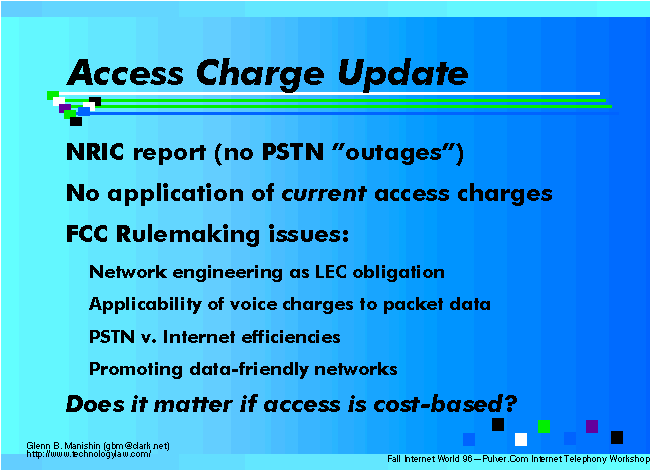
The future is now for Internet access charges! The FCC is preparing to release a request for comment on access charge reform, which will likely include the question of potential access charges for ISPs and OSPs. (Editor's Note: The FCC's Notice of Proposed Rulemaking was issued, after this Fall Internet World 96 presentation, on December 23, 1996.)

Despite the tabloid-style press reports that the Internet is "choking" the PSTN, the reality is quite different. The FCC's Network Reliability & Interoperability Council on November 1, 1996 reported that the Internet's growth "does not pose any unusual network outage hazard." There is also little likelihood that the Commission will support LEC proposals for application of current access charges to ISPs and OSPs. (See Chairman Hundt's rejection of this alternative.) At current levels of $3.60/hour, access charges would blow flat-rated, "all you can eat" Internet services out of the water. The better approach -- one more consistent with the competitive and efficiency goals of the 1996 Act -- is to reform access charges first, bringing them down to cost-based levels (approximately $0.003 or 0.3¢ per minute), before even considering whether to repeal the so-called "ESP exemption."
The FCC's upcoming access charge rulemaking raises several important questions about the relationship between the PSTN and the Internet. These include:
Network engineering responsibility: Because so-called "congestion" of the PSTN is the result of different traffic characteristics of Internet usage compared with circuit-switched telephone calls, why shouldn't the fundamental responsibility for re-engineering the PSTN to handle changing traffic demands rest, as it always has, with the LECs themselves?
Applicability of voice charges for Internet access: ISPs have traditionally been treated by LECs as end users -- rather than as co-equal carriers -- with interconnection on the same technical basis as IXCs not been available to Internet providers. Should voice-based access charges, which reflect use of the end-to-end circuit necessary for a circuit-switched phone call, but not required for Internet access, be extended to ISPs?
Relative efficiency of the Internet: Unlike the PSTN, the Internet is a highly efficient medium, in which many users share the same facility and bandwidth simultaneously. Access charges would simply impose on the Internet the cost inefficiencies of the PSTN. If the question is how to recover the costs associated with ISP use of LEC facilities, shouldn't there be a requirement that LECs make available an efficient, TCP/IP form of data access for ISPs?
Promoting data-friendly networks: Few can disagree with the proposition that tying up telecom switches with packet-switched data is not a good approach to network engineering. Because the "congestion" complaints of the LECs relate to switch usage, the answer is to pursue new forms of ISP access, such as ADSL and others, that are not routed through the LEC switches. If LECs are permitted to assess access charges before offering data-oriented access arrangements, what incentive would they have to deploy the advanced, high-bandwidth networks the next generation of Internet applications is increasingly demanding?
The ultimate question -- one that presents the greatest challenge to the ISP industry -- is whether Internet providers should care about access charges if rates are reduced to the true, incremental cost of access. Forward-thinking ISPs should concede that they can and should "pay for what they get" from the LECs. While those charges are today assessed as business line rates under intrastate LEC tariffs, there should be no policy objection to paying the efficient, long-run cost of appropriate data-friendly access arrangements for ISPs.